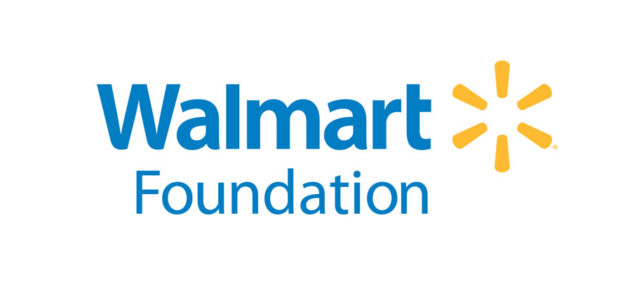Foundation Watch
The Walmart Foundation, a Microcosm of Woke Capital


Why are major corporations supporting left-wing causes? Where did the class-focused Left go, which pit Labor against Capital rather than merely demand that Capital’s slogans match theirs? Tracking the philanthropic giving that a company such as Walmart has engaged in over the years can help explain the woke capital phenomenon.
Early Days
Initially, Walmart was not going to wade into philanthropic matters. “We feel very strongly that Wal-Mart really is not, and should not be, in the charity business,” Walmart founder Sam Walton wrote in his 1993 posthumously published autobiography. “We don’t believe in taking a lot of money out of Wal-Mart’s cash registers and giving it to charity for the simple reason that any debit has to be passed along to somebody—either our shareholders or our customers.”
“As for politics, Sam couldn’t stand the stuff,” said reporter Liza Featherstone in a 2005 piece on Walmart’s charity. Waiting for campaign donations from the Waltons was like “leaving landing lights on for Amelia Earhart,” joked Sen. Dale Bumpers (D-AR) at a 1988 “toast and roast” honoring Helen Walton.
Walton created the Walmart Foundation in 1982, but the company donated only 0.5 percent of its pre-tax earnings to charity, which was between a third and an eighth of what its competitors such as K-Mart, Sears, and Target gave.
But after Sam Walton died 1992, Walmart greatly increased its philanthropic giving, tripling its annual expenditure on donations between 1999 and 2005.
The Bush Years
During the Bush years, Walmart largely donated to right-of-center think tanks, particularly those advocating for charter schools. The recipient organizations included the Evergreen Freedom Foundation, the Mackinac Center for Public Policy, the Pacific Research Institute for Public Policy, the Goldwater Institute, the Hudson Institute, the National Right to Work Legal Defense Foundation, the Heritage Foundation, and the Cato Institute.
But the generosity ran dry: The only conservative organization the foundation has given to since 2017 is the American Enterprise Institute, a stalwart representative of the pro-business wing of conservative ideology.
In the early 2000s, Walmart was receiving a lot of flak. Featherstone described critics’ perception of the company as “a stingy low-wage employer with an arrogant disregard for local and national laws.” Communities were fighting to prevent Walmart from opening stores in their areas. Multiple labor unions were targeting Walmart as a top adversary. Two progressive nonprofits, Wal-Mart Watch and Wake Up Wal-Mart, formed a citizens’ movement against the corporation’s practices. Amid all of this, Walmart was dealing with several employee rights lawsuits. The most notable was Betty Dukes v. Wal-Mart Stores, a sex discrimination class action suit representing 1.6 million women.
The National Committee for Responsive Philanthropy and other liberal watchdog groups were accusing the Waltons of using philanthropy to advance their own interests, funding Republican political action committees to gain control over Congress. Even when donating to causes such as Hurricane Katrina relief, conservative columnists’ praise for Walmart’s efforts as evidence that the private sector is more efficient than government at handling crises only further provoked the ire of their detractors. Featherstone wrote:
It is true that when you starve government by draining its resources and electing officials who don’t believe in it, nothing seems to work. But Wal-Mart played a major role in that eviscerating process. Much of Wal-Mart’s philanthropy (as well as that of the Walton family) has been directed toward promoting anti-government politics, whether by lobbying against high taxes for the rich or contributing to Republican candidates, conservative think tanks and efforts to privatize education.
In usual Marxian fashion, critics saw Walmart’s philanthropic contributions as just smoke and mirrors to ensure that the base of employees and the whole underworld of labor relations remained intact. Politics was just a tool for the Waltons to get rich, cynically using “philanthropy” to bolster an imperialist economic system from which they profited and so forth.
These critiques, combined with the financial catastrophe of 2008 and the Occupy protests, seem to have gotten to the Walmart leadership, who decided that Walmart needed a reputation makeover in exchange for keeping its head.
Walmart Enters the Progressive Donor Class
In the 2010s, Walmart Foundation ramped up its funding of left-wing groups. Apparently, Walmart realized being unwoke was a bad public relations strategy. By ditching the conservative coalition for the identity-obsessed but class-unconscious left, Walmart could retain its lucrative practices overseas and at home without being criticized.
Although most Walmart Foundation grants are distributed through regional stores, all grants must first be authorized by the foundation’s headquarters in Bentonville, Arkansas. Thus, all its philanthropic giving is approved by the highest leadership.
From 2017 to 2019, the foundation gave $5,511,475 to the New Venture Fund, a major left-of-center nonprofit incubator created and managed by Arabella Advisors, a for-profit, privately held philanthropic consultancy empire that directs vast flows of money throughout the progressive nonprofit world.
Over this same period, Walmart Foundation also gave $4,356,750 to FSG Inc., a nonprofit consultancy firm for major left-of-center foundations, and $750,000 to Pew Charitable Trusts, a charity that leans toward liberal causes. In 2019, it gave $858,562 to the Meridian Institute, another consultancy firm for liberal nonprofits.
Walmart Foundation is now a big patron of nonprofits that promote open borders, such as the National Immigration Forum, a group that advocates for amnesty and opposes border enforcement. Walmart gave the National Immigration Forum $2,811,722 in grants from 2017 to 2019. It has given to left-of-center Hispanic identity groups that pursue similar policies: $1,232,127 to the Institute for Latino Progress, $1 million to the Congressional Hispanic Caucus Institute, and $250,000 to the Hispanic Federation.
Walmart Foundation is also an active giver to left-of-center black advocacy groups. Between 2017 and 2019, it donated $1 million to the Congressional Black Caucus Foundation; $500,000 to the National Urban League, a national left-of-center civil rights advocate; and $256,000 to the National Black Justice Coalition, a civil rights advocacy group focused on black LGBT individuals.
Apparently, this was not enough. On June 12, 2020, following the George Floyd riots, president and CEO of Walmart Doug McMillon sent out a statement to all Walmart associates about the company’s commitment to social justice issues. McMillon stated that Walmart’s goal is:
To help replace the structures of systemic racism, and build in their place frameworks of equity and justice that solidify our commitment to the belief that, without question, Black Lives Matter.
Directly addressing store managers and associates, McMillon said that a true “anti-racist ally” should endeavor to “create an environment where Blacks and African Americans, Hispanics and Latinos, Asians, Native Americans, LGBTQ, those with disabilities and women, don’t feel it’s a big decision to speak up.” He went on to explain how the company is going to increase its number of black employees, prioritize minority-owned suppliers, fund historically black colleges, and launch a new think tank—the Center on Racial Equality—to fund research on racism in the United States.
Woke Capitalism
Socially liberal, fiscally conservative. That is the reigning ideology of our society. The story of the Walmart Foundation can stand in for any American corporation, as it is the story of how this ideology, otherwise known as “woke capitalism,” seized control of every powerful entity in our country.
Corporate libertinism has risen to the fore, not by being True, but by a process of elimination. For corporations to survive the anti-Bush brigades and the financial crisis of 2008 along with the subsequent Occupy movement, they needed to find a way to ditch the conservatives, pay lip service to left-wing moralists, and preserve the economic system—and that is exactly what they have done.


